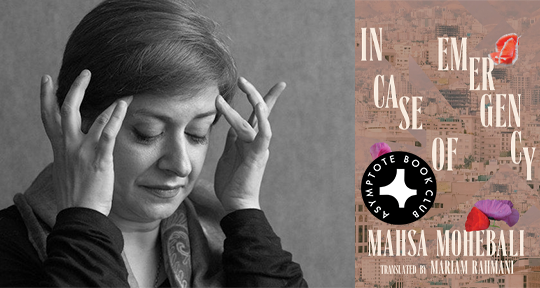What’s more pressing than a natural disaster? An opium addiction. The titular “emergency” in Mahsa Mohebali’s award-winning novel refers simultaneously to shuddering Tehran and the pressing urge of its protagonist, Shadi. In vernacular as electric as it is poetic, In Case of Emergency paints a mad portrait of Iran and its electrifying counterculture, as we follow the brilliantly acerbic Shadi on dissolving boundaries of need and want, of gender, of revolution. The Asymptote Book Club is proud to select this defining text as our last selection of 2021.
The Asymptote Book Club aspires to bring the best in translated fiction every month to readers around the world. You can sign up to receive next month’s selection on our website for as little as USD15 per book; once you’re a member, join our Facebook group for exclusive book club discussions and receive invitations to our members-only Zoom interviews with the author or the translator of each title.
In Case of Emergency by Mahsa Mohebali, translated from the Farsi by Mariam Rahmani, The Feminist Press, 2021
Shadi wakes up to a brutal comedown in her family’s Tehran home. The earth’s been “dancing Bandari”—shimmying, stamping, and shaking, all night, which she actually wouldn’t have minded so much if it weren’t for her mother’s screaming “ten times for each tremor: How many screams does that make?” After a night of earthquakes that show no sign of stopping, her family is preparing for an exodus, but Shadi only has two opium balls left, and that won’t do in the middle of a crisis—or any other day. So she, the well-off daughter of a philandering university professor and a revolutionary-turned-housewife who absentmindedly clicks digital prayer beads, dons masculine clothing, setting off through the upended streets of Tehran to find her next fix.
Shadi, like many of her peers who grew up in post-revolutionary Iran—the majority of the population—is well-educated, jobless, and disillusioned with the repressive regime that hasn’t delivered on its promises. Mahsa Mohebali’s In Case of Emergency (“Don’t Worry” is closer to the Farsi title) was released just one year before the thirtieth anniversary of the Iranian Revolution, and its fictional earthquake, as well as the ensuing chaos and the repeated refrain of the city’s hardened youth—“Everybody relax. This city is ours”—was said to have foreshadowed the real-life Green Movement protests soon to come. Shadi herself, however, is a far cry from either the revolutionaries of her mother’s generation or the protestors of her own: “Arash’s dumb-ass logic is spreading like a breed of Barbapapa,” she laments. “Was the earth fractured or just these idiots’ skulls? This city is ours—I’d really like to know what that actually means.”
Though her profile—including the opium addiction—matches many of her country’s youth, it isn’t often represented in Irani literature. This is due, on one hand, to political censorship. The original version of the novel made it to press with only limited edits, and won the prestigious Houshang Golshiri Award—before being banned on and off. Mohebali is also, as of this writing, prohibited from public speaking. However, social censorship is also at play; Shadi speaks the crass, cosmopolitan slang of the streets, not the lyrical Farsi of the page. Globally, in all four cardinal directions, the expansion of a literary establishment to include vernacular languages and subculture has been characterized by both resistance and fascination; this would be one such catalytic work. READ MORE…



